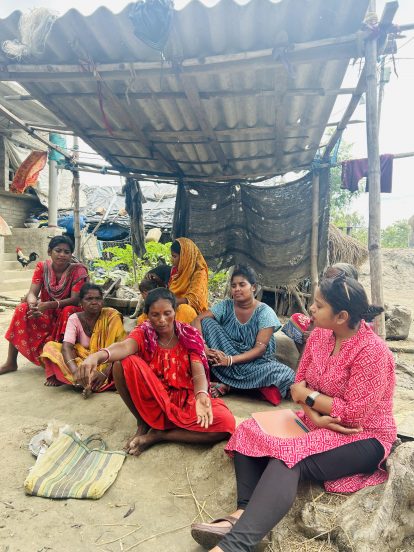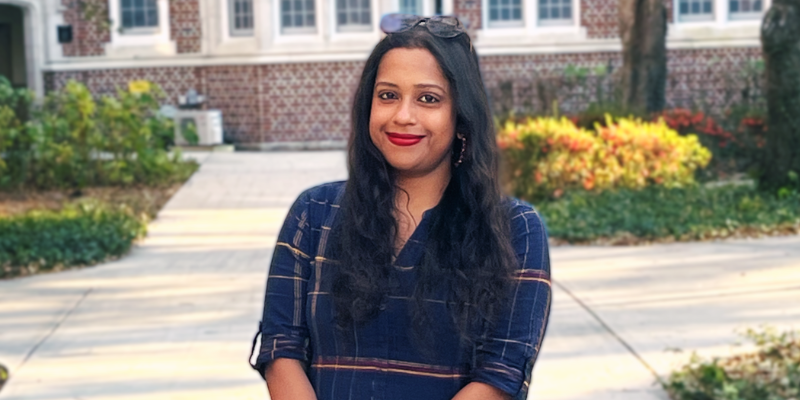The Sundarbans, the largest mangrove forest in Asia, is a region of stark beauty and mounting crisis. As rising sea levels and extreme weather events fueled by climate change threaten its delicate ecosystems, the Sundarbans’ communities bear the brunt of this environmental devastation. At the forefront of this struggle are women—the caregivers, homemakers and stewards of their families—who remain in what is often deemed “uninhabitable” terrain to protect their loved ones while men migrate in search of better opportunities.
This reality resonates deeply with Sayantika Chakraborty, an English doctoral student at the University of Florida, whose own grandmother became a climate refugee over 40 years ago. Growing up, Chakraborty was captivated by the oral histories and personal experiences of other climate refugees, sparking her lifelong commitment to documenting and amplifying their voices.
Chakraborty’s research centers on the experiences of these women who are often excluded from formal narratives about climate crises. “The environment in the Sundarbans is a space dominated by women,” she explained. “While men leave, women stay behind to survive and care for their families in incredibly challenging conditions—brackish water, lack of transportation and limited access to resources or healthcare.” For Chakraborty, this focus is deeply personal, as her grandmother’s stories of displacement and resilience served as an early and profound influence.
“My grandmother was a climate refugee, and I grew up listening to her stories,” she recalls. “Those formative experiences instilled in me a desire to understand the struggles of climate refugees, particularly through a gendered lens.” Early exposure to these narratives, along with her volunteer work with climate migrants and participation in social outreach programs, played a pivotal role in shaping the focus of her research.

Using oral history methods, Chakraborty conducted interviews documenting how environmental changes affect family roles, daily life, and community resilience in the Sundarbans. Drawing on anthropology, the social sciences and literary studies, she aimed to ensure these accounts are recorded and shared in meaningful ways.
Her work was made possible in part by the Tedder Doctoral Fellowship from the UF Center for the Humanities and the Public Sphere, which funded travel to the Sundarbans. This award, one of several offered by the center, reflects its mission to advance humanities research, foster interdisciplinary collaboration, and address pressing societal challenges. “My fieldwork with women in the Sundarbans would not have been possible without the Tedder funds,” she said. “I am glad that in spite of funding challenges in academia, the Center continues to support Ph.D. students in conducting their research.”
However, Chakraborty’s involvement with the center began before her fellowship, through events such as the Scales of Belonging Speaker Series and a grant writing workshop. “It is through my interaction with the people at the Center, especially Jaime Ahlberg, Ph.D., Sara Agnelli Ph.D. and Noah Mullens, that I learned the nuances of doing public humanities work,” she said. “Of special importance here is the grant writing workshop I did under the supervision of Dr. Agnelli, which considerably improved my grant writing skills.”
Looking ahead, Chakraborty plans to continue deepening her research on the Sundarbans and related environmental history projects. In spring 2024, she was awarded a fellowship at the Rachel Carson Center for Environment and Society in Munich, supported by the German Academic Exchange Service (DAAD). Later that year, she received the Modern Language Association’s Edward Guiliano Global Fellowship, along with getting selected for their Public Humanities Incubator. For the latter, she presented on the work of women Bhil artists, a tribal community in India, whose artwork reflects the challenges posed by human-driven, or anthropogenic, environmental pressures. Most recently, she was awarded the Kirkland Dissertation Fellowship from UF’s Department of English, which supports scholarship in oral narratives and cultural studies. This award not only advances her dissertation on stories of climate resilience but also expands her commitment to public-facing humanities work.
As an example of this commitment, Chakraborty will give an invited talk at The Lynx Bookstore on Sept. 23 as part of “Gainesville Reads”, a month-long community reading event that brings together authors, scholars and residents to foster connections between scholarship and community. Drawing on her fieldwork with women climate migrants in India, she will share stories of displacement, survival, and resilience, highlighting how storytelling itself can serve as a powerful tool for communities navigating environmental crisis”.
Reflecting on her journey so far, she offered this advice for other doctoral students: “Knowing what you want to pursue in your research and your larger goal after you graduate is important. A Ph.D. is a long and sometimes isolating journey. If you’re not motivated by your work, it can take a toll. For me, the personal connection I have to this project keeps me going.”
Discover how the Tedder and Rothman Doctoral Fellowships support research like Chakraborty’s.
